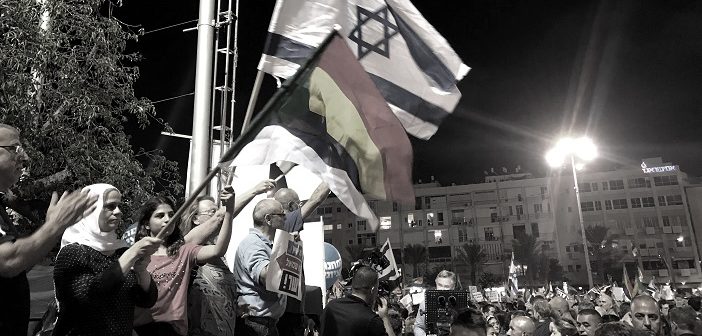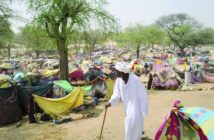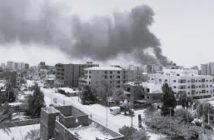Why Israel’s “Nation-State” law is upsetting country’s delicate balance?
They came with Israeli flags and Druze flags, shirts that said: “I am Druze and I am proud.”
More than 50.000 came to demonstrate in Tel Aviv’s iconic Rabin Square on August 4th against Israel’s new “Nation-State” law. It was a protest full of speeches about duty, and army service and national pride. Not the usual kind of protest against a bill that is also imbued with nationalism.
* * *
There are around 150.000 Druze in Israel, a religious minority that also has hundreds of thousands of members in Syria and Lebanon.
In Israel Druze men serve in the army, a form of national service that applies to them and Jews but not to the sizable Arab Muslim and Christian minority.
When the Nation-State law [ed: that law specifies the nature of the State of Israel as the nation-state of the Jewish people] passed on July 19, backed by 62 members of Knesset, many Druze were taken by surprise. Brig. Gen. Imad Fares told reporters that he felt years of progress towards more equality was being eroded. “Going to the army is our duty as the citizens of this country. However, I expect the country to treat me as I treat it.” Mayors of Druze towns in northern Israel, where most Druze live, said the law was discriminatory. They wanted it either changed or for the Prime Minister to guarantee some other kind of support.
A week after the Druze protest, around 30.000 Arab citizens of Israel and their supporters also came to Rabin Square. It was another Saturday night, the traditional night for protests. Unlike the Druze protest, the Arabs didn’t bring Israeli flags.
Some brought Palestinian flags, even though the protest organizers had urged them not to. The next day, after video emerged of some of the Palestinians shouting anti-Israel slogans, Hebrew radio debated how Prime Minister Benjamin Netanyahu had gotten what he wanted.
If the Druze protest had made many Israelis question the Nation-State law, the Arab protest reminded many Israelis why it was necessary.
The Nation-State law enshrines in law what already exists in Israel. It says the country is the homeland of the Jewish people, that the state’s symbol is a blue and white flag with a Star of David and that the national anthem is “Hatikvah”. It says the capital of the country is Jerusalem and that the language of the state is Hebrew, with Arabic having a “special status”. It says the country is open to Jewish immigration and that the start will support cultural, historic and religious legacies of the Jewish people. The law also says the state “views Jewish settlement as a national value”.
Many aspects of the law can be found in the Proclamation of Independence of May 14, 1948. The proclamation mentions “Jew” or “Jewish” 24 times, and supports such elements as immigration and making Israel a Jewish homeland.
But there are key differences. In 1948 the signers sought to create a “state on the basis of full and equal citizenship”. The lack of terms like “equality” in the new nation state law have led to anger in Israel among minorities. The Association for Civil Rights in Israel criticized the proposed legislation in 2017 for “subjugating the democratic character of the state to its Jewish character” and “anchoring racial discrimination”.
Meretz, the left-leaning political party and the Joint List, a combination of several Arab parties and the Jewish-Arab Hadash party, have petitioned the Supreme Court against the law.
Abroad the law has been slammed as a form of “apartheid,” by Turkish presidential spokesman Ibrahim Kalin. Other countries in the region have condemned the law. At the United Nations the Palestinian delegation is seeking to have Israel expelled. The EU has expressed concern about the law. Supporters of the law have pointed out that many other countries are nation states, that they have religious flags or anthems, that they have one national language even if they have minority populations, and that they sometimes enshrine aspects of discrimination.
The law comes as Israel faces numerous small conflicts it has been managing for decades. Netanyahu is likely facing elections next year when he will have been in power ten years. He has navigated the crises of the Arab spring and the rise and fall of ISIS. He has faced a rising Iranian threat that Israel has expressed concern about for years. In Gaza he has managed two wars, in 2012 and 2014, and months of low level conflict this year as the Strip of almost 2 million Palestinians remains under blockade. In the West Bank he has not come to a peace agreement or resolution of the Oslo Accords with the Palestinian Authority. In Israel he has also fended off anger among the Orthodox community over army conscription, and other rancorous disputes over things like religious worship at the Western Wall and Bedouin land claims in the Negev.
The Nation-State crises is just one more thing for him to manage and divided his opponents.
Critics see Netanyahu’s maneuvering on the Nation-State law as cynical populist politics, a way to force critics into the position of opposing the Nation state and thus opposing the Jewish state. Like many things in the Netanyahu era, the Nation-State law was in the works for a decade. It isn’t new, it just happened to pass this year.
This may be one reason that the Jewish left and center hasn’t been robust in opposing it. The New Israel Fund (NIF) sent around a note saying that Israelis “deserve answers from those who voted for it” and that the “NIF is joining with other progressive, Jewish organizations to mobilize our community on this issue. We’re going to get thousands of individuals to pledge to demand answers”. This doesn’t sound like a major pushback campaign.
The same quiet acceptance can be heard in the center and Labor Zionist left. With the Druze and Arab protest over, Rabin Square is once again empty. While the Nation-State bill continues to provoke some controversy abroad, in Israel, absent of a Supreme Court decision to overturn parts of it, the law will go forward. However, it may have upset some aspects of the delicate balance in Israeli democracy, angered Druze and causing Arab parties to reconsider their strategy, upbuilding of the State on the basis of full and equal citizenship.
Brig. Gen. (Res.) Imad Fares was one of 100 Druze reserve officers who protested Israel’s Nation-State law. “Going to the army is our duty as the citizens of this country. However, I expect the county to treat me as I treat it”, Fares said.
* * *
Out the “Nation-State of the Jewish People”, all the medias are speaking about it in Europe, and some use the word “apartheid”.





